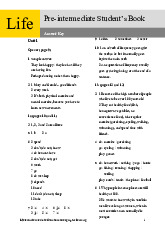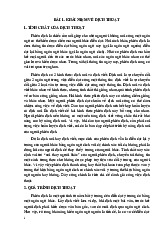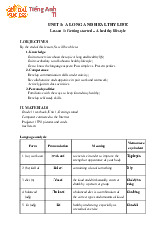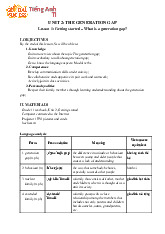





Preview text:
LESSON PLAN
TIẾNG ANH 11 FRIENDS GLOBAL UNIT INTRODUCTION
LESSON IC- VOCABULARY: ADJECTIVES I. OBJECTIVES
By the end of this lesson, Ss will be able to: 1. Knowledge
- Gain an overview about adjectives.
- Gain vocabulary to describe and personalities. 2. Competences
- Develop communication skills and creativity.
- Be collaborative and supportive in pair work and teamwork.
- Actively join in class activities. 3. Personal qualities
- Understand the life events. - Develop self-study skills. II. MATERIALS
- Grade 11 textbook, Unit Introduction, C. Vocabulary
- Computer connected to the Internet
- Projector / TV/ pictures and cards
- Phần mềm tương tác sachso.vn Language analysis Form Pronunciation Meaning 1. punctual (adj) /ˈpʌŋktʃuəl/
happening or doing something at the arranged or correct time; not late 2. envious (adj) /ˈenviəs/
wanting to be in the same situation as somebody else
feeling happy because something unpleasant has 3. relieved (adj) /ˈruːɪn/ stopped or has not happened
feeling that somebody has done something wrong, 4. suspicious (adj) /səˈspɪʃəs/
illegal, or dishonest, without having any proof 5. terrified (adj) /ˈterɪfaɪd/ very frightened 6. sensitive (adj) /ˈsensətɪv/ easily offended or upset Assumption
Anticipated difficulties Solutions
- Encourage students to work in pairs and in groups so
Students are reluctant to work in
that they can help each other. groups.
- Provide feedback and help if necessary.
- Explain expectations for each task in detail.
- Continue to explain task expectations in small
chunks (before every activity).
Students may lack vocabulary to deliver - Provide vocabulary and useful language before a speech assigning tasks
- Encourage students to work in groups so that they can help each other. III. PROCEDURES 1. WARM-UP (3 mins) a. Objectives:
- Introduce the new lesson and set the scene for Ss to acquire new language.
- Get students' attention at the beginning of the class by means of enjoyable and short
activities as well as to engage them in the steps that followed. b. Content: - Exercise 1. (p.10) c. Expected outcomes:
- Students can gain more confidence and interest in the lesson. d. Organisation
TEACHER’S AND STUDENTS’ ACTIVITIES CONTENTS
Exercise 1: In pairs, describe the photo. Would you like to appear on stage in a theatre
production? Why? / Why not? (3 mins)
- Focus attention on the photo and ask students to work
in pairs and speculate about who they can see, where the Students’ own creativity.
people are, what they are doing and whether they are enjoying it.
- Ask a few students to share their ideas with the class.
- In pairs, students then discuss if they would like to
appear in a theatre production and give reasons for their answers.
- Ask a few students to share their ideas with the class. e. Assessment
- Teacher observes the groups and give feedback.
2. ACTIVITY 1: PRESENTATION (17 mins) a. Objectives:
- To get students learn vocabulary related to the topic. b. Content:
- Pre-teach vocabulary related to the topic. - Exercise 2. (p.10) - Exercise 3. (p.10) - Exercise 4. (p.10) - Exercise 5. (p.10) c. Expected outcomes:
- Ss know how to pronounce the new words precisely and use them in appropriate contexts. d. Organisation
TEACHER’S AND STUDENTS’ ACTIVITIES CONTENTS
Vocabulary pre-teaching (6 mins) New words:
- Teacher introduces the vocabulary. 1. punctual (adj)
- Teacher explains the meaning of the new vocabulary 2. envious (adj) by pictures. 3. relieved (adj)
- Teacher checks students’ understanding. 4. suspicious (adj)
- Teacher reveals that these words will appear in the 5. terrified (adj)
reading text and asks students to open their textbook to 6. sensitive (adj) discover further.
Exercise 2. Read and listen to the dialogue. Why does Mason change from feeling anxious to feeling terrified? (2 mins)
- Go through the instructions together and check Answer key:
the meaning of anxious (worried and afraid) and
He’s terrified because he now has to sing a song terrified (very afraid). on his own.
- Play the recording for students to read and listen and note the answer.
- Check the answer as a class.
Exercise 3. Look at the adjectives below. Underline five of them in the dialogue in exercise 2. (3 mins)
- Students find five adjectives in the dialogue in Answer key: exercise 2.
anxious, excited, frightened, terrified, upset
- Check answers as a class. Ask students to use
their dictionaries to check the meaning of any adjectives they do not know.
Exercise 4. Listen to the speakers. How is each person feeling? Choose from the adjectives in exercise 3. (3 mins)
- Go through the instructions together. Answer key:
- Play the recording for students to note down
1 envious 2 confused 3 relieved 4 embarrassed their answers.
5 suspicious 6 excited
- Check answers as a class. Ask why each person
is feeling the way they do, e.g. The first speaker is
envious because his friend has a really nice new phone.
Exercise 5. Work in pairs. Look at the list of personality adjectives below. Then underline four
more in the dialogue in exercise 2. How many other personality adjectives do you know? (3 mins)
- Ask students to read the adjectives and use their Answer key:
dictionaries to check their meanings if necessary.
friendly, punctual, confident, brave
- Students then find four more personality
adjectives in the dialogue in exercise 2.
- Check answers as a class. Ask students to
explain the meanings of the adjectives using the context.
- In pairs, students brainstorm more personality adjectives. - Elicit answers as a class. e. Assessment
- Teacher checks students’ pronunciation and gives feedback.
- Teacher observes Ss’ writing of vocabulary on their notebooks.
3. ACTIVITY 2: PRACTICE (12 mins) a. Objectives:
- Ss can answer the questions to critical thinking.
- They can also finish the tasks in the textbook. b. Content: - Exercise 6. (p.10) - Exercise 7. (p.10) c. Expected outcomes:
- Students can thoroughly understand the content of the text and complete the tasks successfully. d. Organisation
TEACHER’S AND STUDENTS’ ACTIVITIES CONTENTS
Exercise 6. Read the Look out! box. Complete the sentences with an -ed or -ing adjective formed
from the verbs in brackets. (5 mins)
- Go through the Look out! box together. Then say: Answer key:
“The girl is bored” and “The girl is boring”. Ask 1 amazing 2 embarrassed 3 moving 4 surprised 5
students to explain the difference in meaning by bored
giving a reason, e.g. The girl is bored because she
has nothing to do. The girl is boring because she
always talks about the same thing.
- Students complete the sentences.
- Check answers as a class. Check the meanings of
amusing (causing you to laugh or smile) and
moving (causing strong feelings).
Exercise 7. Read the Learn this! box. Which adjectives from exercise 5 can have a negative
prefix? Use a dictionary to help you. (7 mins)
- Ask students to read the Learn this! box. Students Answer key:
then use their dictionaries to find out which flexible – inflexible; honest – dishonest; kind –
adjectives have a negative prefix.
unkind; loyal – disloyal; organised – - Check answers as a class.
disorganised; patient – impatient; reliable –
unreliable; sensitive – insensitive e. Assessment
- Teacher observation on Ss’ performance.
- Teacher’s feedback and peers’ feedback.
4. ACTIVITY 3: PRODUCTION (10 mins) a. Objectives:
- To help Ss practice speaking skills.
- To help Ss express their opinions. b. Content: - Exercise 8 (p10) c. Expected outcomes:
- Students can express their opinions on school stage performance and public speaking. d. Organisation
TEACHER’S AND STUDENTS’ ACTIVITIES CONTENTS
Exercise 8. Work in pairs. Ask and answer the questions. (10 mins)
- Ask students which adjectives in exercise 7 (with or
without negative prefixes) they would apply to
Students’ own creativity. themselves.
- In pairs, students take turns to describe themselves
using the adjectives and modifying adverbs. Encourage
them to give reasons for their choice of adjectives, e.g.
I’m a bit unreliable at times because I often forget things.
- Ask a few students to share their ideas with the class. e. Assessment
- Teacher observation on Ss’ performance.
- Teacher’s feedback and peers’ feedback. 5. CONSOLIDATION (3 mins) a. Wrap-up
- T asks Ss to talk about what they have learnt in the lesson. b. Homework - Prepare for the next lesson Board Plan Date of teaching
TIẾNG ANH 11 FRIENDS GLOBAL UNIT INTRODUCTION
LESSON IC- VOCABULARY: ADJECTIVES * Warm-up - Exercise 1 *Presentation Vocabulary 1. punctual (adj) 2. envious (adj) 3. relieved (adj) 4. suspicious (adj) 5. terrified (adj) 6. sensitive (adj) - Exercise 2 - Exercise 3 - Exercise 4 - Exercise 5 * Practice - Exercise 6 - Exercise 7 * Production - Exercise 8 *Homework




